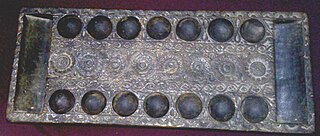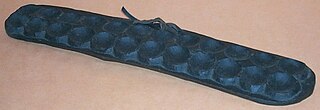
Katro is a traditional mancala game played by the Betsileo people in the Fianarantsoa Province of Madagascar. The game was first described by Alex de Voogt in 1998.

Katro is a traditional mancala game played by the Betsileo people in the Fianarantsoa Province of Madagascar. The game was first described by Alex de Voogt in 1998.
Katro is played on a 6 × 6 board (6 rows of 6 pits each). Each player controls half of the board (three rows). At game setup, two seeds are placed in each pit.
At his or her turn, the player relay sows the seeds from one of his or her pits, with the constraint that the chosen pit must be in the outermost non-empty row. As with most mancala-IV (i.e., mancalas with 4 rows), sowing is confined to the player's own rows. Sowing may occur in two "directions". Consider the following scheme:
a b c d e f l k j i h g m n o p q r M N O P Q R L K J I H G A B C D E F
The southern player can either sow like this:
A B C D E F G H I J K L M N O P Q R A B C....
or like this:
F E D C B A L K J I H G R Q P O N M F E D....
If the last seed of the sowing is dropped in an empty pit, this may cause a capture if the following applies:
If both conditions apply, all the seeds from the opponent's pit are captured, as well as the capturing seed. The player then resumes sowing, using the captured seeds.
The first player to be left without seeds loses the game.

Mancala refers to a family of two-player turn-based strategy board games played with small stones, beans, or seeds and rows of holes or pits in the earth, a board or other playing surface. The objective is usually to capture all or some set of the opponent's pieces.

Oware is an abstract strategy game among the mancala family of board games played worldwide with slight variations as to the layout of the game, number of players and strategy of play. Its origin is uncertain but it is widely believed to be of Ashanti origin.

Kalah is a modern variation in the ancient Mancala family of games, the oldest known version having been found carved into a stone tablet in the 16th-century BCE pyramid of Cheops. The Kalah variation was developed in the United States by William Julius Champion, Jr. in 1940. This game is sometimes also called "Kalahari", possibly by false etymology from the Kalahari desert in Namibia.
Ba-awa is a variant of the game of mancala originating in Ghana. Although played in some of the same regions as Oware, it is simpler and in traditional societies is considered a game for women and children. Ba-awa is related to games j'erin and obridjie played in Nigeria. It is also similar to mancala game anywoli played at the Ethiopian-Sudanese border.

Bao is a traditional mancala board game played in most of East Africa including Kenya, Rwanda, Tanzania, Comoros, Malawi, as well as some areas of DR Congo and Burundi. It is most popular among the Swahili people of Tanzania and Kenya; the name itself "Bao" is the Swahili word for "board" or "board game". In Tanzania, and especially Zanzibar, a "bao master" is held in high respect. In Malawi, a close variant of the game is known as Bawo, which is the Yao equivalent of the Swahili name.
Bohnenspiel is a German mancala game described in the 1937 Deutsche Spielhandbuch.

Owela, also referred to by the Khoekhoe language loanword ǁHus, is the Oshiwambo name of a traditional mancala board game played by the Nama people, Herero people, Rukwangali speakers, and other ethnic groups from Namibia. It is related to the Omweso family of mancala games played in Eastern and Southern Africa. Although this is an abstract strategy game, the consequences of individual moves are so hard to predict that it can be considered, to some extent, a game of chance.

Igisoro is a two-player variant of the mancala family. It is a variant of the Omweso game of the Baganda people (Uganda), and it is played primarily in Burundi and Rwanda. Igisoro, like Omweso and other mancalas from Eastern Africa such as Bao (game), is played with a 4×8 board of pits and 64 seeds. A player's territory is the two rows of pits closest to them.

Ali Guli Mane is an abstract strategy board game of the mancala family, from Karnataka in South India. It is known as Chenne Mane in Tulunaadu, Akal Patta in North Karnataka and Satkoli (सत्कोलि) in Maharashtra. The name of the game, like that of many mancala games across the world, is simply a description of the board used: it means a "wooden block with holes". It is similar to Pallanguzhi from the neighbouring state of Tamil Nadu. There are also similarities with the traditional Malay mancala game Congkak.
Alexander Johan de Voogt or simply Alex de Voogt is a Dutch researcher and associate professor at Drew University, who worked as a curator of African Ethnology at the American Museum of Natural History and best known for his work on the history and distribution of traditional mancala games. He is also editor of Board Game Studies, the main scientific journal on the history of board games.
Andada is a traditional mancala game played by the Kunama people of western Eritrea. It closely resembles other mancalas from East Africa such as Enkeshui and Layli Goobalay.
Hawalis is a traditional mancala game played in Oman as well as Zanzibar, where it is known as Bao la Kiarabu, with slightly different rules. It is closely related to African mancalas such as Bao, Njomba, Lela, Mulabalaba (Zambia), Muvalavala (Angola) and Tschuba.
Daramutu is a traditional mancala game from Sri Lanka. It was first described in 1909 by the British engineer Henry Parker in his book Ancient Ceylon (1909). Traditionally, the game is only played by women.
En Gehé is a traditional mancala game played by the Loitha and Kisonga Maasai groups of northern Tanzania. The game was first described in 1904 by a German soldier, Moritz Merker, who was serving in the Kaiserlichen Schutztruppe in German East Africa. Merker later became the first ethnologist to study the Maasai culture.

Enkeshui is a traditional mancala game played by the Maasai of both Kenya and Tanzania. It is a rather complex mancala game, and bears some similarities to the Layli Goobalay mancala played in Somaliland.
Isolo is a traditional mancala game played by the Sukuma people in northern Tanzania. The rules of the game come in three variants, respectively for women, boys and men.
Kiothi is a traditional mancala game played by the Meru people in Kenya. The word "kiothi" simply means "to place". This mancala is closely related to the Enkeshui and the Giuthi mancalas, respectively played by the Maasai, the Kikuyu and Embu people.
Lamlameta is a traditional mancala game played by the Konso people living in the Olanta area of central Ethiopia. It was first described in 1971 by British academic Richard Pankhurst. It is usually played by men. The name "Lamlaleta" means "in couples".

Layli Goobalay is a board game played in parts of Somalia. It is a variant of the classical count and capture game mancala, which is one of the oldest two-player strategy board games played throughout the world. Layli Goobalay means "to exercise with circles" in the Somali language.
Mbothe is a traditional mancala game played by the Pokomo people that live along the Tana River, in Kenya. Pokomo do not traditionally build gameboards; they dig pits in the ground and use small stones as counters.